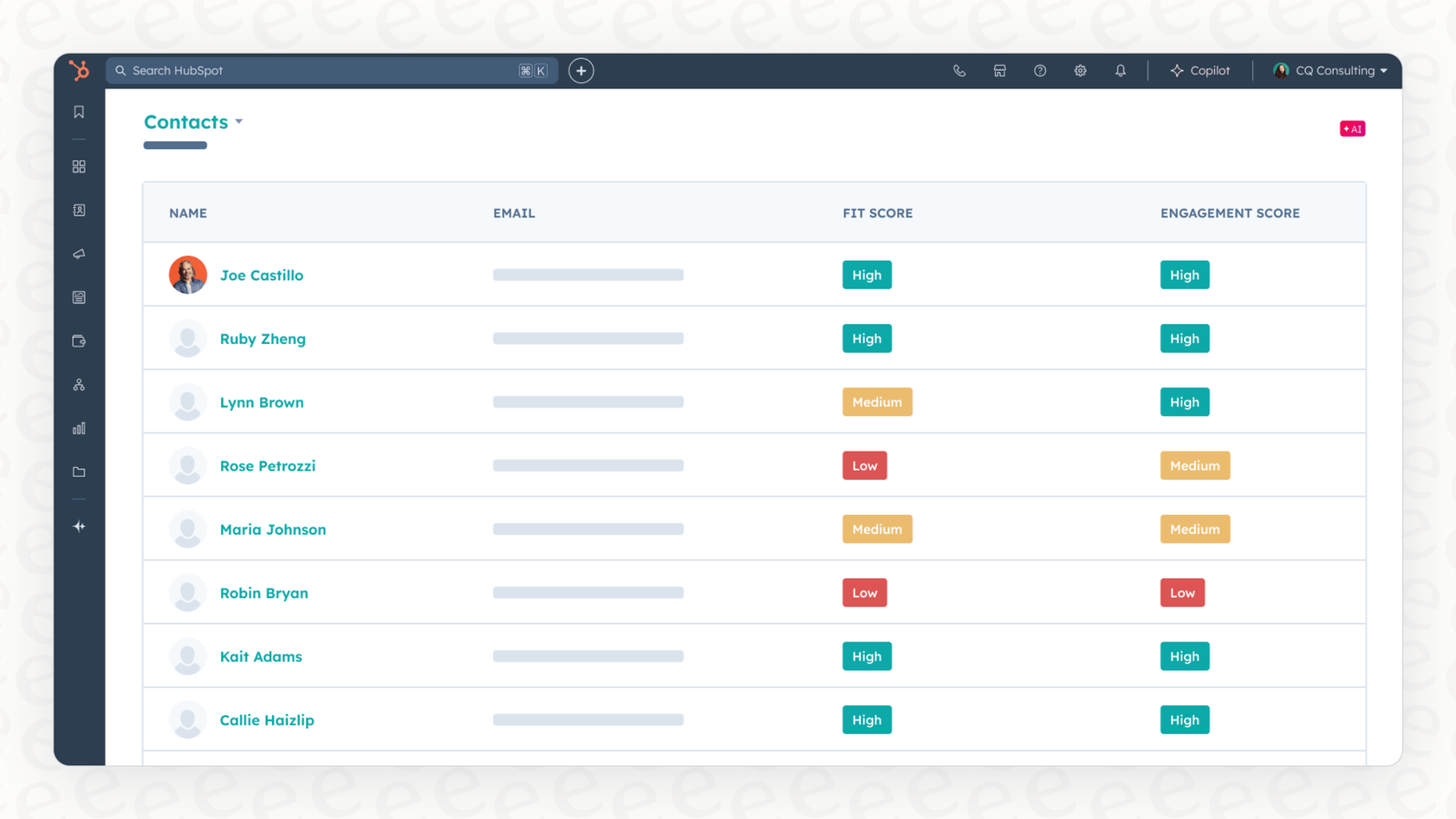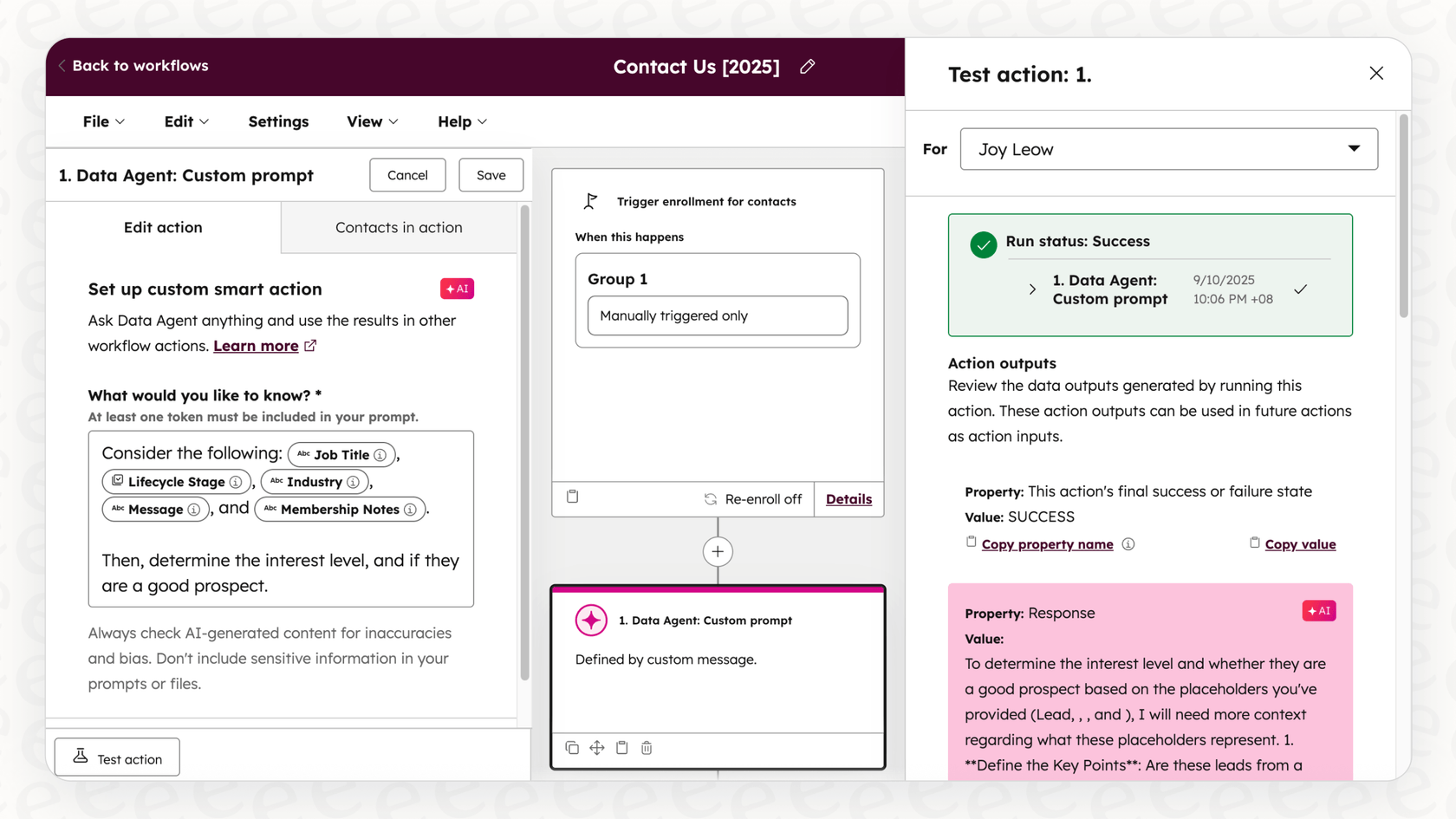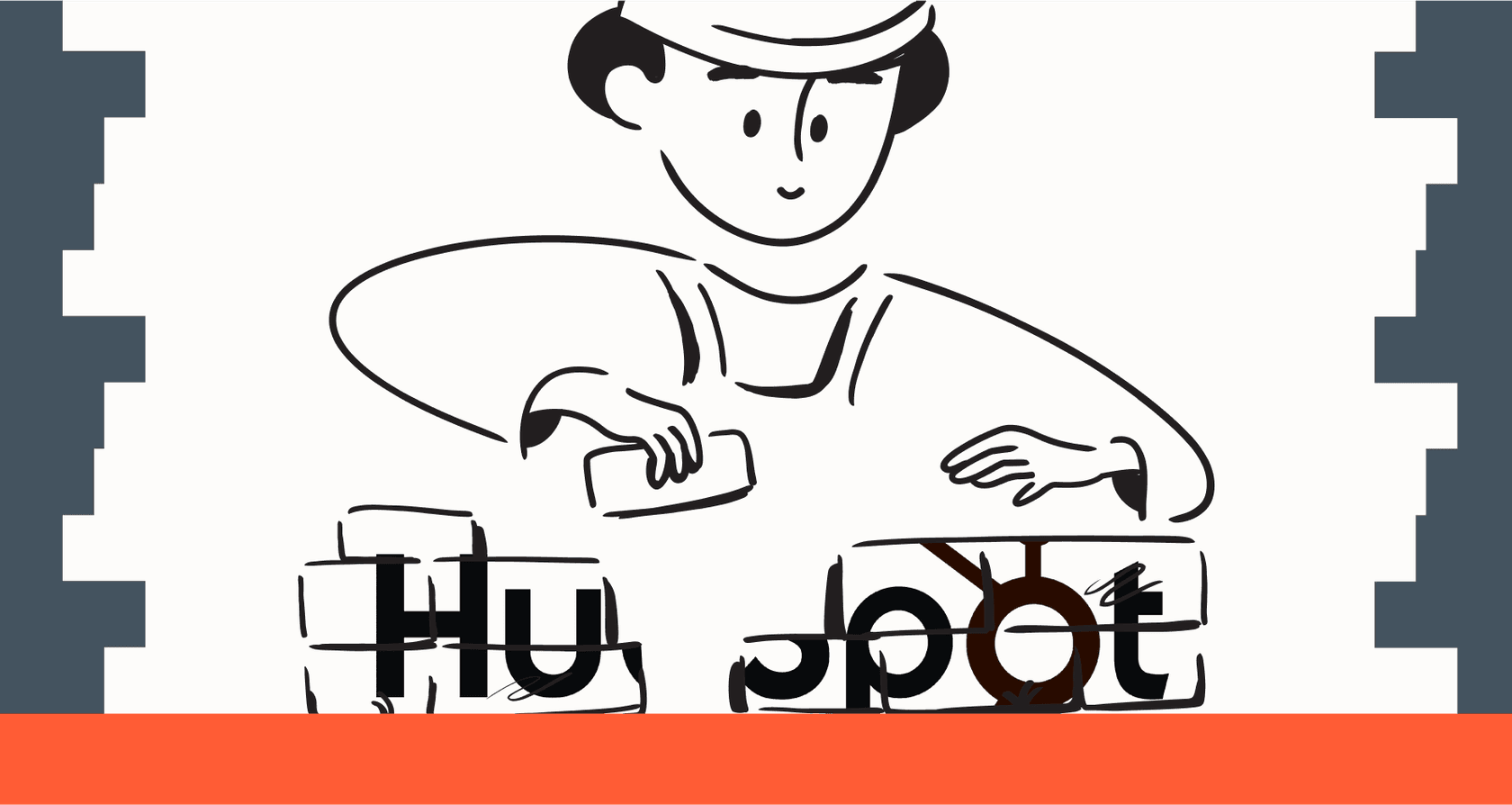A deep dive into the HubSpot AI CRM: Features, pricing and complementary tools (2026)

Kenneth Pangan

Stanley Nicholas
Last edited January 16, 2026
Expert Verified

Let's be real, AI has gone from a futuristic buzzword to a must-have tool for any business that wants to keep up. If you're not using it, you're probably working harder than you need to. HubSpot has definitely gotten the message, pouring a ton of resources into making its platform an all-in-one AI command center for marketing, sales, and service.
But what does that actually mean for you and your team? An "all-in-one" platform offers a unified experience for your data. The point of this post is to give you a clear look at the HubSpot AI CRM. We'll walk through its key features (including the new Breeze AI), look at the pricing, and talk about the considerations for choosing this ecosystem. By the end, you'll have a much clearer picture of whether it's the right move for your company in 2026.
What is the HubSpot AI CRM?
Before we get into all the cool things it can do, it helps to understand that the HubSpot AI CRM isn't just one thing. It’s built on two main components that work together: the Smart CRM and Breeze AI. They’re a team, but they have very different jobs.
What is Smart CRM: The data foundation
Think of the Smart CRM as the central hub for all your customer data. It's the database that stores everything: every contact, company, deal, and support ticket.
The magic isn't just that it holds all this info, but that it connects it across all of HubSpot's different products (or "Hubs"). Every single AI feature, whether it's writing a marketing email or helping you prioritize leads, is fueled by the data in this central system. This is one of the platform's biggest strengths: it creates a powerful, integrated environment where the AI works most effectively when your data is centralized within the HubSpot platform.
What is Breeze AI: The intelligence layer
If the Smart CRM is the foundation, Breeze AI is the brain built on top. It’s the brand name for HubSpot’s whole suite of AI tools and agents. You might have heard of their "AI Copilot" before, but Breeze is a much bigger deal.
It’s easiest to break Breeze into three parts:
-
Breeze Assistant: This is your personal AI helper for day-to-day tasks. Need to summarize meeting notes, draft a quick email, or get the lowdown on a company? This is your tool.
-
Breeze Agents: These are the AI teammates designed to take on specific roles, like assisting with support tickets or identifying new sales leads.
-
Breeze Intelligence: This is the analytics engine working in the background, digging through your data to find trends and insights so you don't have to.
Key HubSpot AI CRM features for go-to-market teams
The HubSpot AI CRM isn't a separate product you buy; its features are woven throughout the Marketing, Sales, and Service Hubs. Let's look at how it actually helps your teams get their work done.
HubSpot AI CRM for marketing teams
For marketers, HubSpot’s AI is all about doing more, faster. Staring at a blank page trying to write another blog post or email campaign? The AI Content Writer and Email Writer can spin up a solid first draft in minutes, which is a huge timesaver. Beyond just creating content, the platform uses AI to help you find and build specific audience segments. It can even create lookalike lists to help you target website visitors who are acting like they're ready to buy. It also brings AI into its reporting, helping you spot campaign trends efficiently.
HubSpot AI CRM for sales teams
On the sales side, the AI is focused on making sure your reps spend their time on the right things. The predictive lead scoring feature looks at your historical data to bubble up the leads most likely to become customers, allowing your team to focus their energy effectively. The upcoming Prospecting Agent is designed to take that even further by helping identify and qualify new leads for you.

A really useful feature is Conversation Intelligence. It records, transcribes, and analyzes sales calls, giving you summaries and coaching opportunities for managers. And, just like for the marketing folks, the AI Email Assistant is there to help sales reps write personalized outreach and follow-up messages much more quickly.

HubSpot AI CRM for service teams
Service teams get some of the most powerful customer-facing AI tools. You can set up an AI-powered chatbot on your website to handle common questions around the clock. This bot is what HubSpot calls the "Customer Agent," and it’s trained on your knowledge base to resolve issues efficiently. Within the help desk, AI gives your human agents a hand by summarizing complicated ticket histories, suggesting replies based on similar solved tickets, and even drafting new knowledge base articles after a problem gets solved.
Breeze AI agents in the HubSpot AI CRM: The next step in automation
Beyond the helpful features baked into each Hub, HubSpot is investing heavily in its autonomous Breeze Agents. These are designed to be AI teammates that can run entire processes for you.
Here are the main agents HubSpot is rolling out:
-
Customer Agent: Think of this as your automated frontline support. You train it on your help center content and other knowledge docs, and it gets to work resolving customer questions. HubSpot is designed to handle common queries, freeing up your team to focus on the more complex issues.
-
Prospecting Agent: This agent is like a virtual sales development rep (SDR). It helps process your CRM and other data sources to find companies that seem ready to buy, then assists in crafting personalized outreach emails at scale.
-
Data Agent (Beta): This agent is your personal data analyst. You can ask it in plain English, like, "Show me all enterprise customers who we haven't contacted in 90 days," and it will generate the report for you. It's also designed to help clean up and enrich the data in your CRM automatically.

The goal is to create a system that is truly AI-driven, making the most of HubSpot's comprehensive data model.
This official tutorial provides a comprehensive overview of Breeze AI, HubSpot's suite of AI tools designed to enhance productivity across its CRM platform.
Considerations for the HubSpot AI CRM ecosystem
While having everything in one place is powerful, it is important to consider how this fits into your existing workflow. A unified platform approach offers great depth, especially for businesses looking to centralize their operations.
Maximizing the HubSpot ecosystem
To get the full value from HubSpot's AI, many teams choose to commit fully to the ecosystem, including Marketing Hub, Sales Hub, and Service Hub. The AI is at its most powerful when it can see data from every part of that ecosystem.
If your team is currently using various different tools, transitioning to HubSpot's unified platform is a significant project. However, the result is a highly integrated environment where data flows seamlessly between departments.
Implementation and adoption
HubSpot is a robust and comprehensive platform. Implementing its advanced AI features benefits from a structured approach, including setup, configuration, and team training to ensure everyone is getting the most out of the system.
This is where a tool like eesel AI follows a complementary philosophy. Instead of requiring a platform transition, eesel AI is designed to plug right into the helpdesk you already use. With simple integrations, you can be up and running quickly to enhance your existing setup.
Rollout and testing considerations
Deploying AI to interact with customers is an important step. HubSpot provides the tools to manage these interactions directly. For teams looking for additional testing options, specialized tools can provide another layer of analysis.
For example, eesel AI offers a powerful simulation mode that lets you test an AI agent on your past support tickets in a safe environment. This allows you to forecast performance and fine-tune behavior, serving as a helpful companion to your CRM rollout strategy.
HubSpot AI CRM: Standardized automation and flexible workflows
HubSpot's AI is powerful and designed to work optimally within the HubSpot framework. It provides a reliable foundation for your business processes.
With eesel AI, you get additional options for a fully customizable workflow engine. It can work alongside HubSpot to define a specific tone of voice or create custom actions to pull data from various sources like Google Docs or Confluence. It's a great way to bring together knowledge from all your company's sources.
A look at HubSpot AI CRM pricing
HubSpot offers various pricing tiers to match different business needs, with features bundled into different Hubs. The platform is designed so that the value of your investment scales with the robust features provided.
The Breeze Customer Agent, for example, is part of the Service Hub Professional plan, which starts at $100 per user, per month. HubSpot's tiered structure ensures that as your team grows, you have access to the enterprise-grade features required for success.
Here’s a look at the plans where the main AI features live:
| Hub / Plan | Starting Price (Monthly) | Key AI Features Included |
|---|---|---|
| Marketing Hub Pro | $890/mo | AI-powered emails, personalization, campaign automation |
| Sales Hub Pro | $100/mo/seat | Sales automation, conversation intelligence |
| Service Hub Pro | $100/mo/seat | Help desk automation, Breeze Customer Agent, knowledge base |
| Enterprise Tiers | $3,600+ /mo | Advanced AI reporting, custom objects, greater capacity |
Is the HubSpot AI CRM the right choice for your business?
The HubSpot AI CRM is a seriously powerful and deeply integrated platform. If your company is already running on HubSpot or you're looking to consolidate your tools into one trusted place, it offers a seamless experience that is among the best in the industry.
While an all-in-one platform is a fantastic choice for many, some teams prefer to maintain their existing specialized tools. For those who want top-tier AI while keeping their favorite help desk, a complementary solution can be a great fit.
This is where a tool like eesel AI comes in. It provides powerful AI automation that works alongside your CRM, learning from your past tickets and connecting your various knowledge sources to enhance the tools you already know and love.
Whether you choose to go all-in with HubSpot's impressive suite or use a specialized companion, you can have a powerful AI agent tailored to your business in no time. See for yourself by starting a free trial or booking a demo today.
Frequently asked questions
The HubSpot AI CRM is an integrated platform that combines HubSpot's Smart CRM (for data management) with Breeze AI (its suite of intelligent tools and agents). It serves as an all-in-one solution designed to enhance marketing, sales, and service operations. All AI functionalities are powered by the unified data within the Smart CRM.
For marketing, it aids in content creation, audience segmentation, and reporting. Sales teams leverage it for predictive lead scoring, conversation intelligence, and email assistance. Service teams benefit from AI-powered chatbots, ticket summarization, and suggested replies, significantly improving customer support efficiency.
The primary consideration is that HubSpot's AI is most powerful when data is centralized within its ecosystem. This unified approach ensures the AI has the most accurate context to assist your teams effectively. Because it is a robust platform, it rewards teams that lean into its comprehensive set of tools.
While HubSpot offers integrations, you can fully leverage the power of the HubSpot AI CRM by committing to its unified platform. The AI's effectiveness is maximized when it has access to data across HubSpot's Marketing, Sales, and Service Hubs, allowing for a seamless experience across your entire organization.
AI features are bundled within HubSpot's various Hubs (Marketing, Sales, Service) and their Professional or Enterprise tiers. Pricing is typically per user, per month, and offers tiered plans to match different team sizes and requirements as your business scales.
HubSpot provides a robust platform for live interaction. While it focuses on active deployment, teams can manage their rollout strategy to ensure effective customer engagement as they scale their use of these intelligent features.
Share this post

Article by
Kenneth Pangan
Writer and marketer for over ten years, Kenneth Pangan splits his time between history, politics, and art with plenty of interruptions from his dogs demanding attention.






